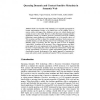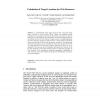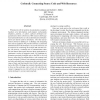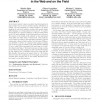128
Voted
AISADM
2005
Springer
15 years 8 months ago
2005
Springer
RDF (core Semantic Web standard) is not originally appropriate for context representation, because of its initial focus on the ordinary Web resources, such as web pages, files, dat...
127
Voted
WISE
2006
Springer
15 years 8 months ago
2006
Springer
. A location-based search engine must be able to find and assign proper locations to Web resources. Host, content and metadata location information are not sufficient to describe t...
116
click to vote
ICALT
2006
IEEE
15 years 8 months ago
2006
IEEE
Reusing existing web resources for e-learning is a very promising and highly promoted idea in the research field of web-based education, especially for intelligent or adaptive sys...
ER
2007
Springer
15 years 8 months ago
2007
Springer
Abstract. Biologists usually focus on only a small, individualized, subdomain of the huge domain of biology. With respect to their sub-domain, they often need data collected from v...
102
Voted
AIIA
2007
Springer
15 years 8 months ago
2007
Springer
Due to the fast growing of the information available on the Web, the retrieval of relevant content is increasingly hard. The complexity of the task is concerned both with the seman...
117
Voted
VL
2008
IEEE
15 years 9 months ago
2008
IEEE
When faced with the need for documentation, examples, bug fixes, error descriptions, code snippets, workarounds, templates, patterns, or advice, software developers frequently tu...
139
click to vote
IRI
2008
IEEE
15 years 9 months ago
2008
IEEE
Much of the Web’s success rests with its role in enabling information reuse and integration across various boundaries. Hyperlinked Web resources represent a rich information tap...
103
Voted
HT
2009
ACM
15 years 9 months ago
2009
ACM
In previous research it has been shown that link-based web page metrics can be used to predict experts’ assessment of quality. We are interested in a related question: do expert...
146
Voted
DEXA
2009
Springer
15 years 9 months ago
2009
Springer
Tagging has become increasingly popular and useful across various social networks and applications. It allows users to classify and organize resources for improving the retrieval p...
113
Voted
WSKS
2009
Springer
15 years 9 months ago
2009
Springer
Tagging allows people to effectively organize web resources such as images, bookmarks or blog articles. Things are found easier by browsing tag clouds relying on the tags that hav...




